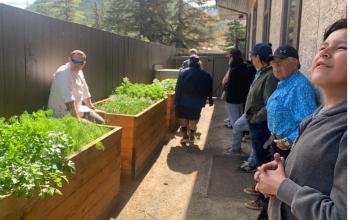Image Caption
Summary
Local Journalism Initiative Reporter
Windspeaker.com
The unique way in which literacy and essential skills are taught by marrying Stoney tradition and culture with western ways in the tourism and hospitality industry has won a Calgary non-profit organization a national award.
Further Education Society of Alberta (FESA) has been recognized by ABC Life Literacy Canada with the 2022 Canada Life Literacy Innovation Award for its Cooks with Stones program. The annual award recognizes organizations that develop and implement innovative adult literacy skills programs in communities across Canada.
The Cooks with Stones program, which wrapped up its second season of operation this past week, was created with the Stoney Nakoda community. The program builds literacy and essential skills by supporting meaningful job placements with hospitality employer partners through traditional Stoney skills and teachings and demonstrates how they relate to workplace success.
“There are so many different skills that you need (but) there are so many similar skills that you need too,” said Shawna Linklater, facilitator and trainer of Cooks with Stones. Linklater is a member of Nelson House (Nisichawayasihk Cree) First Nation.
Understanding that the traditional skills from cooking on the land over an open fire can be transferred into a western restaurant kitchen has built the confidence of Stoney participants, says Linklater.
Kitchens even included labeling in the Indigenous language so the Stoney line cooks could “visually see that their community is being represented within the workplace,” said Teal Dratowany, Pathways Project manager with FESA.
It was a concrete indication of a reciprocal relationship as the partners learned tradition and culture from the Stoney community, she adds.
"Our employer partners have been very open, authentic, really genuinely wanting to learn. (They) have come out to camp, have come out to the program. (They) have put a lot into it. They've really tried to get their whole staff on board. We've done a lot of training with them prior to the program,” said Dratowany.
Employers even modified their workers’ schedules to allow them to participate in powwows and dances this summer.
FESA is a non-Indigenous organization but Dratowany, who is also non-Indigenous, stresses the importance of having Indigenous voices at all levels of the non-profit, including as members of the board and community partners and employed as staff and consultants.
The Cooks with Stones program was driven by the Stoney community, who invited organizations from both inside the community and outside to work in partnership. The program was delivered by knowledge keepers, Stoney Nakoda researchers and Elders.
Dratowany says focus was placed on the tourism and hospitality industry because federal government funding was available for that sector. Prior to the coronavirus pandemic in 2020, the tourism and hospitality industry was needing employees. Now that call is even greater, she said.
The next round of funding for Cooks with Stones has been tailored to youth 16 to 30 years of age, she says. Work will get underway with the community to identify the supports that the youth require.
Dratowany also points out that last year’s Stoney participants were offered permanent jobs. While some were able to take up the offer, others opted not to in order to return to school or find jobs closer to home.
“The supervisors and employers have been really good at trying to understand some of the barriers that the participants are facing and trying to come up with strategies to work around them, to understand,” said Dratowany.
Whether those adaptations will become permanent is yet to be seen, she admits.
“They’re really trying to create a few things, take small steps, make incremental change that will hopefully stick and we’ll see. We’re still in the very early years of this,” she said.
But with the Indigenous population being the largest growing demographic, Linklater says she believes the small steps that are being taken now by some employers to embrace Indigenous traditions will grow.
“I feel it will happen eventually,” she said. “And further down the line, (employers) will definitely make any schedule work.”
The award from ABC Life Literacy Canada comes with $20,000. Dratowany says that money will go primarily for student bursaries to help participants in the next Cooks with Stones program.
The Cooks with Stones program is part of the Going the Distance Project, a larger initiative undertaken by FESA.
Going the Distance created a framework that identified program placements and what other organizations across Canada could do in working with Indigenous communities. The framework will soon be available to the public on a website format.
ABC Life Literacy Canada provided $10,000 each to two honourable mention projects: Inclusive Futures: Skilled Workforce Development in Nunavut, offered by Pinnguaq Association in Iqaluit; and Adult Basic Education Level 1 offered by Stella’s Circle Community Services in St. John’s, Newfoundland.
Local Journalism Initiative Reporters are supported by a financial contribution made by the Government of Canada.

